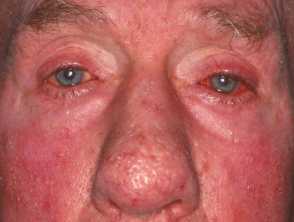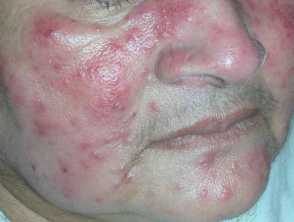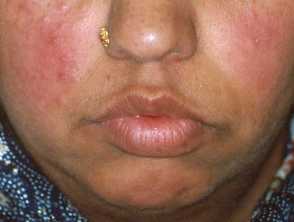Rosacea
If you have ongoing symptoms of the face or eyes, schedule now with a Mid TN Skin expert for a diagnosis and treatment. With our team of experts, you can regain your healthy skin confidence.
Examples of Rosacea



What are the Symptoms of Rosacea?
- Facial redness.
- Acne-like bumps.
- Enlarged nose.
- Facial spider veins.
- Swollen or thickened skin.
- Burning sensation
- Flushing.
Causes of Rosacea
- Combination of genetic, environmental, and vascular factors likely contribute to its development.
- Abnormalities in the face blood vessels.
- Reaction to microscopic mites commonly found on the face.
How to Prevent Rosacea
While there is no guaranteed way to prevent rosacea, certain lifestyle modifications and skincare practices may help reduce the risk of developing symptoms or minimize their severity. Here are some tips to potentially prevent or manage rosacea:
- Sun Protection: Protect your skin from the sun by using a broad-spectrum sunscreen with at least SPF 30.
- Gentle Skincare Routine: Adopt a gentle skincare routine using mild, fragrance-free cleansers and moisturizers.
- Temperature Control: Stay cool in warm weather and protect your face from harsh winds in cold weather.
- Dietary Considerations: While there is no specific "rosacea diet," some individuals find that certain foods can trigger their symptoms. Pay attention to your diet and note any patterns in symptom aggravation.
- Avoid Harsh Skincare Procedures: Steer clear of harsh skincare treatments such as chemical peels or abrasive exfoliants, as they may irritate the skin.
- Use Hypoallergenic Products: Choose hypoallergenic and non-comedogenic skincare and makeup products to reduce the risk of skin irritation.
- Consult a Dermatologist: If you notice persistent redness, flushing, or other symptoms suggestive of rosacea, consult with a dermatologist for a proper diagnosis and personalized treatment plan.
Rosacea FAQs:
Identifying and avoiding triggers like spicy foods, alcohol, and extreme temperatures can help manage flare-ups. A gentle skincare routine, including mild cleansers and moisturizers, is essential.
You can still wear makeup with rosacea, but it's crucial to choose products designed for sensitive skin. Mineral-based or hypoallergenic makeup is often a good choice. Consult with a dermatologist for recommendations.
Sunscreen is crucial for rosacea-prone skin. Opt for a broad-spectrum, SPF 30 or higher sunscreen, and apply it daily. Sun protection helps prevent flare-ups triggered by sun exposure.
Rosacea is a chronic condition, but with proper management and treatment, symptoms can be controlled. Working with a dermatologist to find an effective treatment plan is essential.
Watch: Sunscreen Tips
How to Treat Rosacea
To begin your personalized rosacea treatment plan, schedule an appointment with us now for expert guidance and care.
Featured Products for Sun Safety

EltaMD UV Lotion Broad-Spectrum SPF 30
Develop a daily sun protection habit by keeping this moisturizing sunscreen handy for the entire family. Use EltaMD UV Lotion from head to toe to hydrate the skin and protect against sun damage. 7.0 oz

EltaMD UV Sport SPF 50 3oz, 7 oz
Have your fun in the sun – but play it safe. This sunscreen is great for swimmers, skiers, runners, golfers and other athletes – or for those who just love to be outdoors! UV Sport is water-resistant, so it won’t rinse off in water or drip into your eyes and sting when you sweat.
